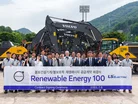Volvo CE & LS Electric: Solar panels in South Korea

Volvo Construction Equipment (Volvo CE) is partnering with LS Electric to install solar panels at its Changwon facility in South Korea.
The company has committed to buy the green electricity for 20 years, from 2024 to 2043, providing approximately 55 GWh of renewable energy per year. It will enable Volvo CE in Korea to reduce around 21,000 tonnes of CO2 emissions annually - the equivalent of planting 1.5 million pine trees.
This site is expected to be running 100% renewable energy by 2026, as part of Volvo CE in Korea working towards ensuring a stable supply of renewable energy by establishing its own power grid.
Renewable energy provision: Procuring electricity
Volvo CE saw an increase in global sales by 11% in Q1 2023 as there was continued demand for its services in Europe and North America in particular.
The company has always stressed the importance of renewable energy provision and how significant it is to the Volvo Global Science Based Targets commitment. The commitment works towards targeting a net zero value chain greenhouse gas emissions by 2040, with significant reductions as early as 2030.
Working to drive construction industry transformation with a focus on environmental care, Volvo CE hopes to better combat climate change. It is aiming to achieve a 30% reduction in carbon emissions across the use of its products with electrification and also cut emissions in half across its own operations and manufacturing processes.
In a background of companies worldwide actively investing in solar plants, Volvo CE continues to work towards embracing decarbonisation. The facility has so far achieved a saving of 10,616 MWh of total energy consumption at the Changwon Plant, as well as having a 20% increase in energy efficiency since 2014.
The Changwon facility in South Korea is the Volvo CE’s largest excavator production site and specialises in the manufacturing of demolition equipment and pipelayers, as well as having a Research and Development department.
It has already begun to introduce electric forklifts and Automated Guided Vehicles (AGVs) into its operations prior to this investment, with further plans also underway to phase out the usage of kerosene for heating, starting in 2026, and implementing a conversion to LNG fuel electric energy by 2028.
Andrew Knight, Head of Excavator Strategy & Managing Director, Volvo CE Korea, said: “We are dedicated to sustainable growth and establishing pioneering partnerships to help accelerate that growth.
“With this agreement, Volvo CE aims to transition all electric consumption to renewable energy at the Changwon plant. Through this holistic approach, we are leading our industry’s transformation towards a carbon neutral future.”
Entering into a direct power purchase agreement (PPA) with LS Electric, Volvo CE hopes to procure electricity from external power generation facilities. Volvo Trucks Korea has also announced a separate partnership with LS Electric to procure solar energy to supply the Dongtan, Gimhae and Incheon offices in South Korea.
- How Data is Driving McCarthy's Sustainability TransformationSustainability & Green Building
- How Anthropic Funds Grid Builds for AI Data Centre BoomConstruction Projects
- Skanska's £273m Construction Project in the Heart of LondonConstruction
- Robotics, Affordability, Subsea: Top 5 Construction StoriesConstruction Projects



